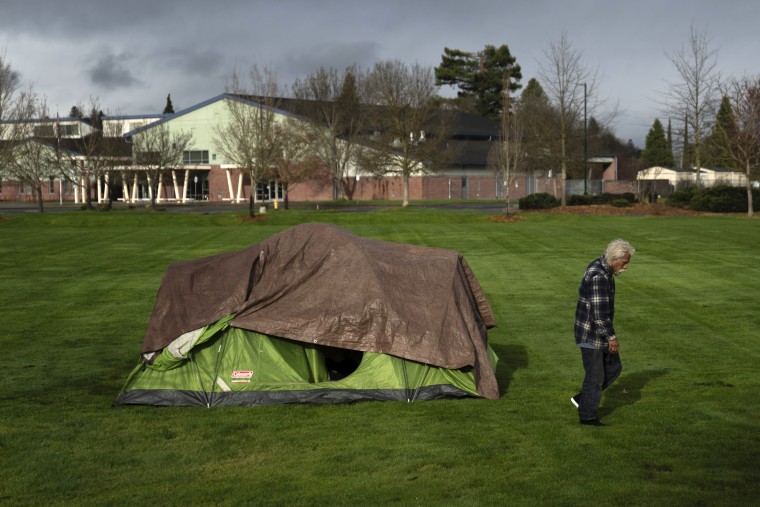WASHINGTON — Conservative Supreme Court justices appeared skeptical Monday about a challenge to municipal ordinances that punish homeless people for camping on public property when they have nowhere else to go.
The court, which has a 6-3 conservative majority, is reviewing an appeals court ruling that said several ordinances enacted by the small city of Grants Pass, Oregon, are prohibited under the Constitution’s Eighth Amendment, which bars cruel and unusual punishment.
The ordinances bar sleeping or camping on publicly owned property, including sidewalks, streets, bridges and city parks. Punishment, which is the key issue in the case, can include fines of up to several hundred dollars and exclusion orders barring people from public property.
Exacerbated by lack of housing and the high cost of rent, homelessness and how to deal with it have become flashpoints in many communities across the country.
Justices repeatedly conceded that addressing homelessness is a complicated policy question, but the conservative members of the court expressed doubts that a lawsuit under the Eighth Amendment was the best way to deal with it.
Justice Brett Kavanaugh, one of the conservatives, said that before they reach a constitutional issue, the justices "usually think about whether state law, local law already achieves those purposes so that the federal courts aren't micromanaging homeless policy."
He and others raised the prospect of homeless people being able instead to mount a defense under state law known as the "necessity defense," in which people can claim they had no choice but to violate the law.

Fellow conservative Neil Gorsuch raised similar questions, noting that if courts find cities cannot punish homeless people for sleeping outside, the same logic could apply to other ordinances, such as those prohibiting urinating or defecating in public.
"How about if there are no public bathroom facilities? Do people have an Eighth Amendment right to defecate and urinate?" he asked.
Chief Justice John Roberts appeared equally resistant to the idea that courts have a role to play in overseeing homeless policy.
"Why would you think that these nine people are the best people to judge and weigh those policy judgments?" he asked.
Advocates for the homeless argue that the ordinances in effect punish people for existing when they have no other place to go and that the measures do nothing to address the underlying issue of housing shortages.
They note that cities already have the power to regulate encampments, something that is not at issue before the Supreme Court.
The court's three liberal justices appeared more sympathetic to the plaintiffs.
Justice Sonia Sotomayor addressed the prospect of other cities' enacting similar policies that encourage homeless people to seek shelter elsewhere.
"Where do we put them if every city, every village, every town lacks compassion?" she asked. "Where are they supposed to sleep?"
Justice Ketanji Brown Jackson, in wondering whether a homeless person could ever bring a claim under the Eighth Amendment if the court overturned the appeals court ruling, asked what would happen if "the city decided it was going to execute homeless people."
It would be a "very extreme scenario," but it would "solve the problems you're talking about," she told the city's lawyer, Theane Evangelis.
Justice Elena Kagan also probed the city's arguments, saying that if people can be punished for sleeping then perhaps, under the same theory, cities could also punish people for breathing, because both actions are a "biological necessity."
"For a homeless person who has no place to go, sleeping in public is kind of like breathing in public," she added.
The ruling issued in 2022 by the San Francisco-based 9th U.S. Circuit Court of Appeals applies to all nine states within its jurisdiction, including California. Several of those states have large populations of homeless people.
Among those asking the Supreme Court to overturn the appeals court are local officials in Los Angeles, San Francisco, Phoenix and other cities.
The Biden administration has mostly backed the challengers, having filed a brief in support of neither side saying laws that bar sleeping on public property are unlawful "if they are applied in a manner that prevents an individual without available shelter from residing in the jurisdiction."
The appeals court ruled 2-1 that Grants Pass, which is about 250 miles south of Portland, cannot “enforce its anti-camping ordinances against homeless persons for the mere act of sleeping outside with rudimentary protection from the elements, or for sleeping in their car at night, when there is no other place in the city for them to go.”
The decision applies only in situations in which homeless people “are engaging in conduct necessary to protect themselves from the elements when there is no shelter space available,” the court added.
The case arose after a group of homeless people challenged the application of the ordinances. They say there is no shelter space, so they have little option but to sleep outside.

City officials maintain that the ordinances pass legal muster and are aimed at curbing the proliferation of homeless encampments.
Officials argue that their policies are aimed at encouraging homeless people to seek housing, although the city itself does not have its own shelter. It directs people to one run by a religious organization that has limited space and imposes various conditions.
"Fines and short jail terms for camping on public property are not cruel and unusual punishments," the city's lawyers wrote in court papers.
